-Mexican Ambassador
Mexican Ambassador, Fernando Sandoval says the new regional bloc formed by Latin American and Caribbean states was meant to create “our own space” to advance common interests on specific issues and that differences of opinion in the region were not likely to hamper the process.

The process for constituting the community is not complete, which he admits, but it is currently being referred to as the Community of Latin American and Caribbean States. It is the most recent of the blocs in the Latin America and Caribbean region and was set up with the provision that the United States and Canada should be excluded.
Ambassador Sandoval told Stabroek News in an interview on Thursday that the community is a mechanism which offers the countries in the region a unified forum to advance common regional interests and according to him, there are many of these. He believes the new grouping will have an impact on the affairs of the region, declaring that the issues are “important to our population.”
Ambassador Sandoval pointed to what he said distinguishes the community from the more established Organ-ization of American States (OAS), noting that the OAS is more of a continental body given its wider membership.
He added that the OAS is recognized for its long and rich history in the region while stressing that the new forum is more informal and flexible. He emphasized that the US and Canada are important to the region saying that the community is not meant as an alternate body to the OAS.
Mexico expects the new community to achieve the objectives set out in the plan of action which was initiated, the Ambassador said, noting that the difference of opinions in the region is not likely to hamper the process. He said common purposes exist amid the confrontations, adding that issues such as poverty, health and the global economic crisis are among the problems which are common to the region. “This will go beyond our differences,” he said of the rifts in Latin America.
The countries which formed the new community met in the Riviera Maya, Mexico, on February 23 and issued the Declaration of Cancun, which Ambassador Sandoval said, has priority areas such as cooperation on economic matters; deepening regional integration; the physical integration of infrastructure, science and technology; social development and education, health and public services, among others.
He listed economic integration; energy; climate change and health among the critical areas to be tackled. Speaking within the context of the challenges facing smaller economies in achieving energy security, he said that the new community recognizes this and that its emphasis would be placed on the importance of cooperation and integration as a means to encourage efficiency and energy-saving and a rational and efficient use of both fossil fuels and renewable energy resources. He said they believe it is necessary to make investments in the region to facilitate the development of long-term potential in the areas of renewable and non-renewable energy.
The community will operate as a unified block, he said, that respects the tenets of democracy.
He said it also embraces the legacy of the Rio Group and the Latin American and Caribbean Summit on Integration and Development. Further, he noted that it will operate on the principles of solidarity, flexibility, plurality and diversity, among others.
Caricom-Mexico Summit
Mexico hosted two summits in February, and Ambassador Sandoval also spoke on the Mexico/ Caricom summit which was held on February 21 prior to the Unity Summit that established the new community.
He said that Mexico had declared its intention to deepen relations with Caricom when it established an embassy here in Guyana.
Following the Mexico/ Caricom joint commission in October last year, he said a decision was taken to hold a summit, and just recently Mexico’s President Felipe Calderon extended an invitation to Caricom leaders to hold talks in his country.
Ambassador Sandoval called the inaugural summit a starting point to greater free-trade relations and the fostering of a new phase of shared development between Mexico and Caricom.
Speaking on the Declaration of the first summit, he said a commitment was given to face common challenges, including climate change, security, and the international economic crisis. It was also agreed that Caricom would convene an economic seminar later this year aimed at identifying commercial niches and investment opportunities for member states and Mexico.
The Ambassador said the leaders endorsed the Caricom/Mexico technical cooperation programme and agreed to explore a financial mechanism to support its implementation, including the establishment of a Caricom/ Mexico financial cooperation fund.
He also said that the declaration emerging from the summit points to the need for information sharing regarding the security sector, in particular the pursuit and the establishment of a Witness Protection Programme and an Advanced Passenger Information System with regard to travel in the western hemisphere, and also the fight against transnational organized crime and its related activities.
A declaration on Haiti also came out of the summit which pointed to the urgent need to assist with tents and other forms of shelter for the Haitian people made homeless by the earthquake.
He said housing and accommodation is a priority sector for the social and economic development of the Caricom nation. Climate change was another key issue which was addressed, and a declaration issued.
He said an agreement was reached to convene the second Caricom-Mexico Summit in 2012 in Barbados to follow up on the agreements adopted at the inaugural meeting.





